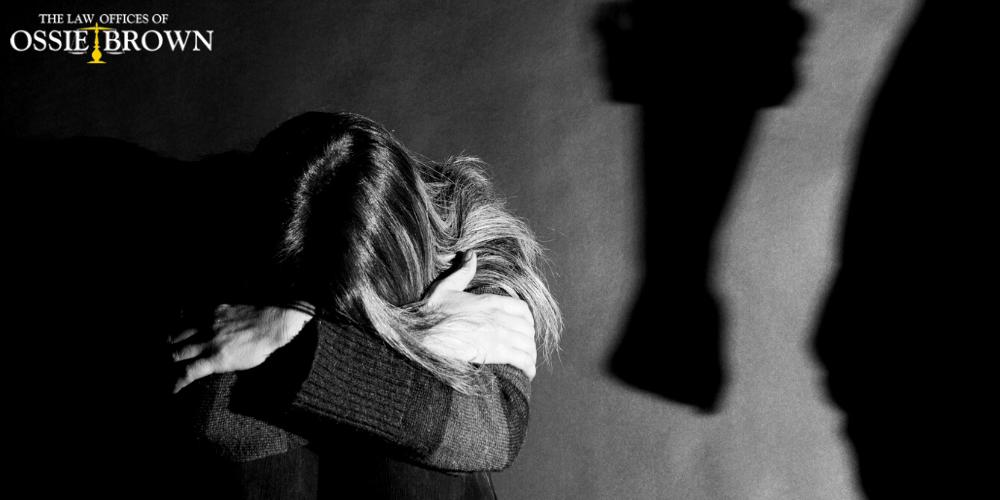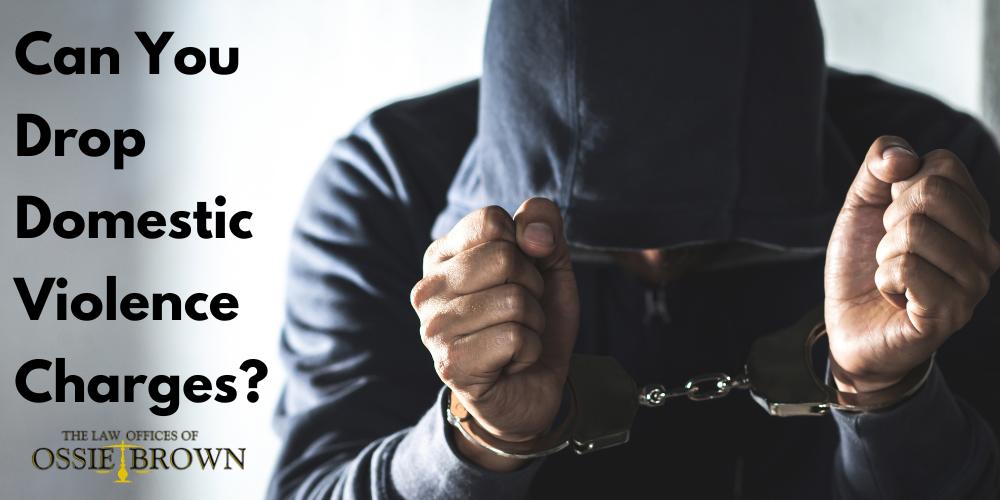Domestic violence, also known as domestic abuse battery, is a very serious crime that comes with major penalties. Maybe you’re the victim, family member, or offender involved in a domestic violence situation, and you’re wondering: can you drop domestic violence charges? The short answer is no, but it’s complicated. Below, our Baton Rouge criminal defense lawyers break down the answer to this question in detail so you can know what to expect in your domestic violence case moving forward.
At the Law Offices of Ossie Brown, our defense lawyers have what it takes to handle both sides of domestic violence cases. We can create a solid criminal defense strategy on behalf of the offender, and our Baton Rouge personal injury lawyers can help victims file civil personal injury lawsuits against their abusers so that they may receive justice for their suffering. Call our law firm at 225-343-1111 to schedule a free consultation today.
What is Domestic Violence?
Domestic violence is technically called domestic abuse battery or domestic battery under Louisiana law. What was is the meaning of domestic battery in Louisiana? Domestic violence or battery occurs when one member of the household inflicts violence or force on another member of the household. Domestic violence can occur between spouses, dating partners, and even roommates.
Domestic violence most commonly describes physical violence such as hitting, punching, slapping, throwing, stabbing, strangling, or shooting. Many victims suffer severe bodily injuries and even death from their abusive housemates. This physical violence is often accompanied by other types of abuse too, including:
- Psychological Abuse is when someone uses words or behaviors to intentionally cause emotional trauma to a victim. Psychological abuse can involve control tactics, manipulation, gaslighting, stalking, threatening, verbal abuse, or public humiliation.
- Sexual Abuse occurs when someone inflicts sexual violence upon a victim without their knowledge or consent. Common types of sexual abuse include rape, molestation, stealthing, producing or distributing a partner’s pornography, etc. Contact our Baton Rouge sexual offense lawyers to learn more.
- Financial Abuse occurs when a household member fully controls another household member’s finances without their permission. Perpetrators of domestic violence typically resort to financial abuse to keep the other person trapped in the home or the relationship.
If you’ve been charged with domestic abuse battery in Louisiana, contact our Baton Rouge domestic violence lawyer team for a free consultation.
Domestic Violence Penalties in Louisiana
Perpetrators of domestic violence can face serious charges and penalties in the state of Louisiana, depending on the number of offenses.
- First Offense: The first offense of domestic abuse battery is considered a misdemeanor in Louisiana. Perpetrators can face $300 to $1,000 in fines and up to 6 months in jail. At least 48 hours of this jail sentence must be served without the benefit of probation, parole, or suspension.
- Second Offense: Louisiana law states that the second offense of domestic abuse battery is also a misdemeanor. Penalties include a $750 to $1,000 fine and 60 days to 1 year in jail. At least 14 days of this jail sentence must be served without the benefit of probation, parole, or suspension.
- Third Offense: Louisiana law states that the third offense of domestic abuse battery is a felony. Perpetrators will face a minimum fine of $5,000 and 10 to 30 years in jail. At least 3 years of this jail sentence must be served without the benefit of probation, parole, or suspension.
- Fourth and Subsequent Offenses: Louisiana law states that fourth and subsequent offenses of domestic abuse battery are also considered felony charges. Penalties include a minimum fine of $5,000 and 10 to 30 years in jail. At least 3 years of this jail sentence must be served without the benefit of probation, parole, or suspension.
If you’ve been charged with felony domestic abuse, contact a Baton Rouge felony domestic violence lawyer for a free consultation.

Can You Drop Domestic Violence Charges?
The short answer to this question is no, a domestic violence victim cannot just drop the charges against a domestic violence offender, especially if a criminal prosecution is underway.
Usually, a domestic violence case begins with a victim (or a witness) calling 911 during a violent encounter. A responding police officer will analyze the situation by listening to witness statements, taking pictures of the attack scene, and gathering other evidence. If there is probable cause, a police officer will arrest the alleged abuser and hold them in jail for at least a few days for a “cooling off period.” From there, the state government will decide whether or not to proceed with pressing criminal charges. After an arrest takes place, a victim has no control over whether domestic violence charges are dropped or not. This is fully up to individual state laws, the prosecution, and whether or not it can be proven beyond a reasonable doubt that domestic violence occurred.
Criminal Cases vs. Civil Suits
In order to fully understand the answer to the question of dropping charges or other similar questions, like can someone in Louisiana press charges without evidence, one must understand the difference between criminal cases and civil lawsuits.
A criminal case is one set forth by the state or prosecution in response to a criminal offense. The goal is to press criminal charges against the offender and put them in jail, if necessary. Meanwhile, a civil case is one that’s brought against someone for committing wrongful, negligent, or violent acts. The goal here is for the victim to obtain justice and financial compensation for their suffering. A victim in a domestic violence situation would have grounds to file a civil lawsuit against their abuser in order to recover compensation for damages like personal injury, medical bills, lost wages, emotional distress, and more.
If a victim were to move forward with a civil case, they would essentially have full control and, therefore, be able to “drop charges” if they so choose. Again, in a criminal case, victims have little to no control over involvement over whether or not the case proceeds. At most, victims would be able to testify against their abuser in court if it came down to that.
Our Baton Rouge violent crimes lawyers can explain in more detail through a free consultation.
Domestic Violence Restraining Orders
A restraining order in Louisiana, or a no-contact order, is another type of civil action that victims can file against a person accused of domestic violence. Similarly to civil lawsuits, victims would have full control of a civil protection order and, therefore, could terminate the order later if they wanted to.
Call our Baton Rouge restraining order lawyers to see what proof you need for restraining orders in Louisiana and how we can help with this process.
Can You Recant a Domestic Violence Statement?
Yes, you can recant a domestic violence statement, but this will not result in charges dropped against the abuser.
To recant a statement about an alleged crime means to change the statement or take it back. It’s very common for domestic abuse victims to recant their statements in an attempt to drop a criminal domestic violence charge, even though that’s not how it works. In fact, 80% to 90% of victims end up recanting their statements at some point during domestic violence cases.
It’s never a good idea to recant domestic violence allegations in an attempt to drop charges. While alleged victim statements are a convincing piece of evidence, they are not everything. Without a victim’s input, the prosecution can still move forward with a case if they have enough evidence elsewhere: police reports, pictures, witness statements, etc. Also, many victims don’t realize that recanting their statements could put them at risk for falsifying information to both law enforcement and the court, which means that they could receive a criminal charge on their record. That’s why it’s always a good idea for a victim to speak with a family law attorney or a criminal defense attorney before making any rash decisions.
Reasons Why Victims Often Recant Their Domestic Violence Statements
Victims choose to recant their statements in a domestic violence case for a variety of reasons, including:
- Trying to spare the alleged abuser from facing criminal charges.
- Feeling intense pressure from the abuser or family members about having the domestic violence charges dropped.
- Feeling ashamed or embarrassed about the domestic violence situation.
- Relying on the abuser for financial support and therefore wanting to keep them out of jail.
- Hearing statements from the abuser about how they’re contemplating suicide or self-harm due to the stress of the domestic violence case.
Both civil and criminal domestic violence cases are incredibly emotionally confusing for the victim. Many victims spend years of their lives in a constant cycle of abuse, and even still, find themselves wanting to protect their abuser from the law. That’s why many states offer free resources, such as mental health counseling and victim advocates, to help victims properly navigate the impossible situation they’re in.

Baton Rouge Domestic Violence Lawyers
At the Law Offices of Ossie Brown, we handle both criminal defense cases and personal injury cases. If you’re facing domestic violence charges, you need a strong criminal defense strategy to help you receive the best case outcome possible. A Baton Rouge criminal defense lawyer at our law firm has what it takes to help you get a diminished charge, jail sentence, or fine. Above all else, we’ll protect your legal rights.
Meanwhile, if you’re a victim of domestic violence, you may have grounds to file a personal injury lawsuit against your abuser. We can help you recover financial compensation for damages such as medical bills, lost wages, emotional distress, and so much more.
Call the Law Offices of Ossie Brown at 225-343-1111 to schedule a free consultation with our experienced legal team today.


